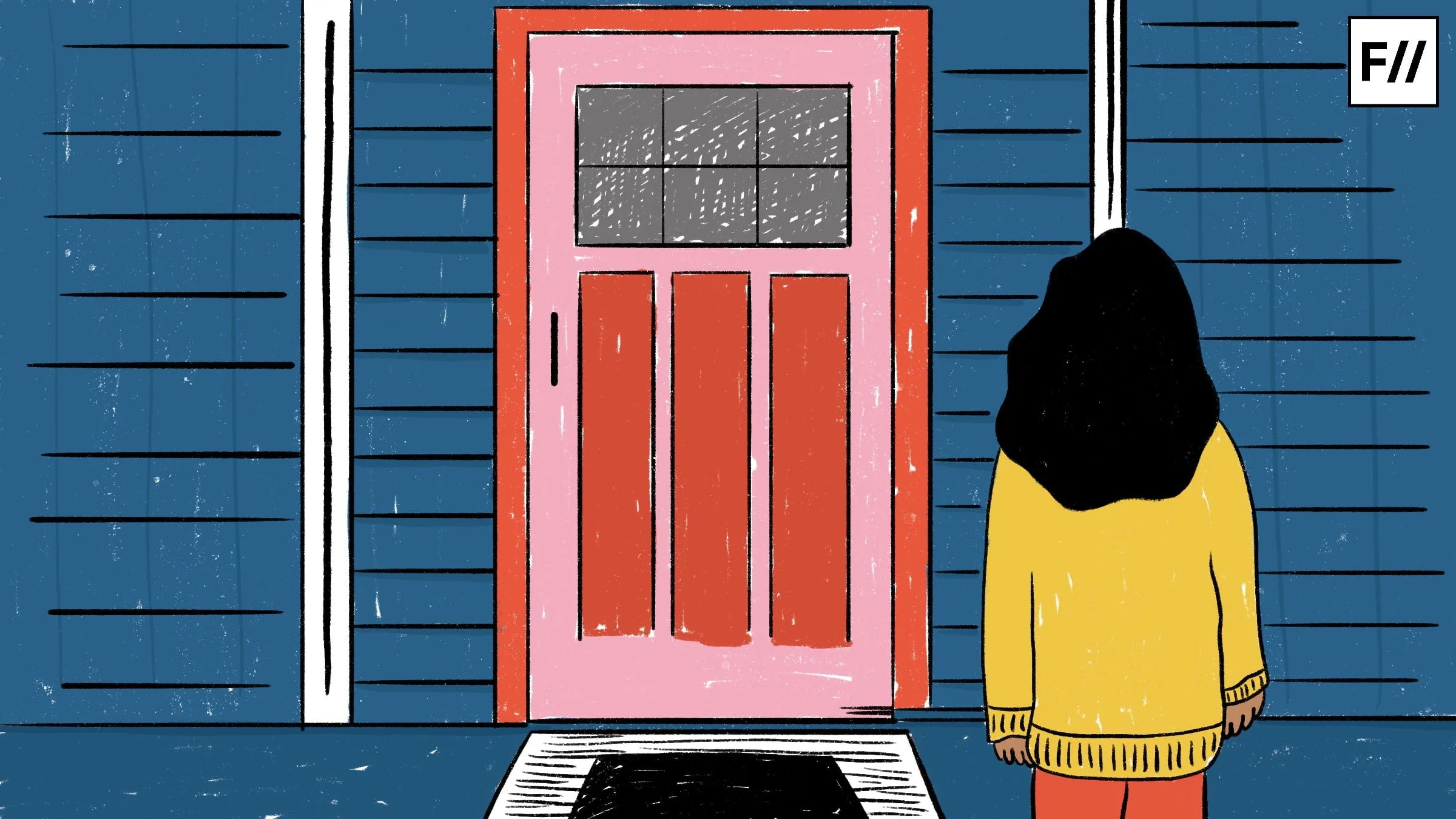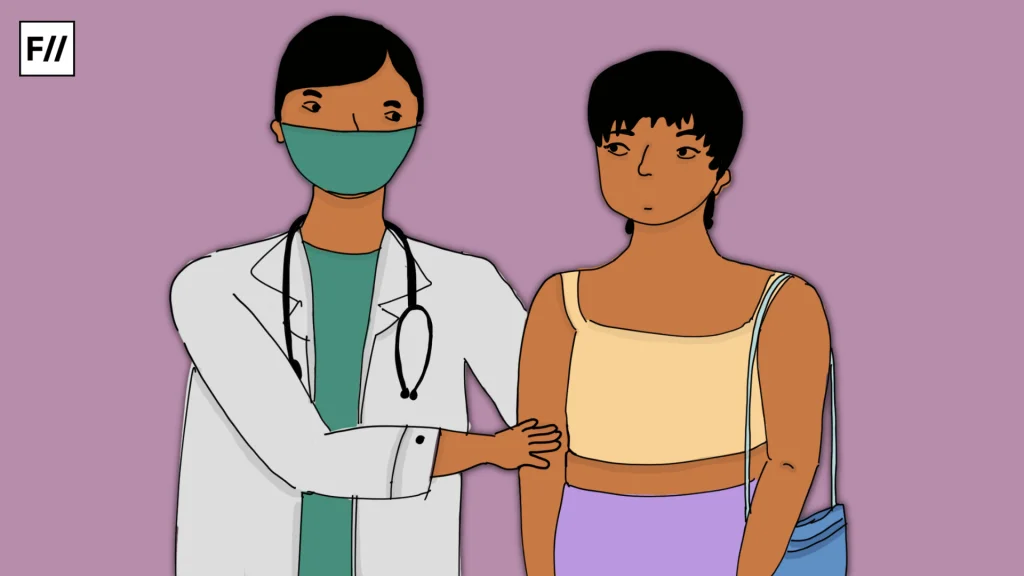Access to healthcare, especially safe, dignified, quality care, is fraught with inequalities. When we think of inequalities in healthcare access, economic disparities are perhaps one of the greatest barriers that come to mind. And while it’s true that financial means are an important factor with regard to access, social identities of patients seeking care also play a significant role in determining if they receive healthcare at all, and if they do, the quality of care received. Due to rampant discrimination within healthcare against patients from marginalised identities, access to healthcare looks vastly different for various classes of people in India.
Due to rampant discrimination within healthcare against patients from marginalised identities, access to healthcare looks vastly different for various classes of people in India.
A doctor’s office should be a safe space, but this is far from the truth. 1 in 4 Indians reportedly face discrimination in matters of healthcare. A 2021 Oxfam report found that 30 per cent of overall respondents, a third of Muslim respondents, and a fifth of Dalit and Adivasi respondents reported discrimination by healthcare professionals and hospitals on religious and caste grounds.
Oxfam CEO Amitabh Behar, addressing the report, said, ‘The surveys show that the basic rights of patients in India are being routinely denied in healthcare facilities, for the poor and middle class alike. Skewed power dynamics with respect to class, caste, religion, and gender between the healthcare providers and patients deepen existing structural inequalities in the healthcare system.‘ Given the extensive healthcare discrimination prevalent across the country, it is vitally important that healthcare professionals, both current and future, be trained to provide inclusive care, with an emphasis on creating a safe space for patients, to ensure equitable care for all.

However, the recent changes in the medical curriculum underline just how dire the situation of healthcare discrimination and lack of inclusive, responsible, and socially accountable medical care is in India. The National Medical Commission (NMC) released its revised Competency-Based Medical Education Curriculum Guidelines, 2024 for undergraduates on August 31. In the latest curriculum, lesbianism and sodomy were categorised as ‘unnatural sexual offences‘ and content on the importance of the hymen and definitions for terms like virginity and defloration were included. The curriculum also omitted the previous requirement for seven hours of mandatory disability competencies.
The revisions caused widespread outrage because of the sexist, homophobic, and exclusionary nature of the changes. After sharp disapproval and protest from queer activists and disability rights groups, on September 5, the NMC issued a notice withdrawing the revised curriculum.
But despite the withdrawal, the inclusion of such problematic ideas rooted in dated notions about sex, gender, and sexuality, speaks to the larger issue of medical care being governed by cisheteropatriarchal ideas of morality and how healthcare practitioners often act as enforcers of it. The change is also perplexing, given that the NMC had last changed the undergraduate curriculum two years ago to address this very sexism and homophobia in medical syllabi. Going against its own 2022 advisory, the NMC inexplicably attempted to scale back progressive changes it had made earlier.
Sexism, queerphobia, and ableism create barriers to healthcare access
A different Oxfam report found that socio-economic factors determined the health status of various social groups. Men performed better on health indicators than women, the upper caste population performed better than SCs and STs, Hindus did better than Muslims, the urban population was better off than the rural, and the rich outperformed the poor. Considering this discouraging status of healthcare access, there is an urgent need for the sensitisation of healthcare practitioners to provide care that is free of prejudice and informed by actual science and facts, not bigotry and antiquated ideas of morality.
Not only are patients from these social groups subjected to poor quality of care, but the process of accessing and seeking medical care can be daunting, humiliating, and traumatising.
While healthcare is rife with many forms of prejudice on various lines of class, caste, race, religion, sexuality, and gender; medical sexism, queerphobia, and ableism continue to be the most institutionalised forms of it; creating barriers to accessing quality, dignified medical care for various classes of citizens: women and girls, victims of sexual violence, gay and bisexual people, transpersons, and people with disabilities. Not only are patients from these social groups subjected to poor quality of care, but the process of accessing and seeking medical care can be daunting, humiliating, and traumatising.

Queer people, people with disabilities, and women all face healthcare discrimination in one form or another. Queer people face uphill battles in accessing safe and respectful healthcare. This is why the NMC’s curriculum including lesbianism and sodomy as ‘unnatural sexual offences‘ is especially egregious, but it wasn’t the only queerphobic inclusion. Transvestitism was categorised as a sexual perversion along the likes of fetishism, frotteurism, and necrophilia. The curriculum also didn’t distinguish between consensual sex between queer people, adultery, and offences like bestiality and incest.
Changes to this queerphobia is what the NMC sought in its 2022 advisory, asking universities and colleges to not approve books that contained ‘unscientific, derogatory, and discriminatory information about virginity, LGBTQIA+ community, and homosexuals.‘ LGBTQ identities have long been pathologised and this not only causes healthcare discrimination but legitimises it. Deeming sexual identities as ‘unnatural‘ or as ‘offences‘, and drawing associations between them and crimes such as bestiality, incest, or frotteurism, criminalises these identities, allowing for rampant medical discrimination and harassment with impunity.
The medical field is also marred by ableism. A study found that 42.5 per cent of people with disabilities faced problems in accessing healthcare during the COVID-19 lockdown. Critical information gaps and a severe lack of understanding of disabilities among healthcare practitioners exacerbate systemic issues within the healthcare system that people with disabilities face. Mandatory training in disability competencies was an important safeguard against this by sensitising healthcare providers to the needs of people with disabilities.
Institutionalised patriarchy and misogyny that permeate all aspects of healthcare have long resulted in women being denied meaningful and respectful access to care.
Women are also recipients of healthcare discrimination. Institutionalised patriarchy and misogyny that permeate all aspects of healthcare have long resulted in women being denied meaningful and respectful access to care. Women are routinely dismissed, disregarded, and chastised by healthcare professionals, especially when accessing reproductive care. To then lend legitimacy to ideas of virginity, defloration, and the importance of the hymen – terms that are patriarchal fiction with no basis in science – by attempting to include it in the study of medicine is a transparent effort to moral police women, at the cost of providing them decent healthcare.
Favouring moral policing to science
The curriculum debacle not only makes the politics of access glaringly obvious, but speaks to the acceptance, and even encouragement, of healthcare practitioners moral policing patients under their care. Doctors should not be arbiters of morality; not only is that outside the scope of their jobs, it prevents them from doing their jobs ethically and effectively.

But prejudiced healthcare practitioners aren’t the only cause of discrimination and bias in the healthcare system. Laws and policies further such discrimination, too, and don’t effectively safeguard against it. Barriers in seeking abortions, despite legality, is perhaps a manifest example of such moral policing. While abortions are legal in India, with a relatively decent gestational limit compared to many countries, safe abortions are still out of reach for many due to medico-legal moral policing, primarily directed at young and unmarried women.
A 2022 United Nations Population Fund report found that eight women died each day in India each day due to unsafe abortions, and between 2007 and 2011, 67 per cent of abortions carried out in the country were unsafe. Thus, preaching and legitimising misogynistic constructs such as virginity and the importance of the hymen, when people are losing their lives to such moral policing, is inexcusable.
Queer people also face similar prejudice and moral policing. Gay and transgender people are forbidden from donating blood citing HIV concerns. But there is no basis for this, and in India, data categorically refutes this claim. According to a 2021 report by the National Aids Control Organisation, 83 per cent of HIV/AIDS infections were among heterosexual people and only 2.5 per cent among gay and bisexual people. Another study found that systemic barriers were preventing trans, non-binary, and gender-diverse persons from seeking healthcare, including denial of services by healthcare practitioners and disregard for privacy and consent.
These patriarchal and heteronormative narratives have no scientific basis, and it is outrageous that doctors have been taught these falsehoods as legitimate science and facts for as long as they have. While the new curriculum has been withdrawn, there is no denying the poor state of healthcare access for many in India, and the very introduction of the revised curriculum speaks to how there is little desire to improve the experience of the healthcare system for millions.
Healthcare discrimination is a systemic issue that can only be addressed through the sensitisation of practitioners, inclusive healthcare policies, and progressive legislation.
Healthcare discrimination is a systemic issue that can only be addressed through the sensitisation of practitioners, inclusive healthcare policies, and progressive legislation. The sensitisation of healthcare providers is of course an uphill challenge due to their own prejudices and information gaps when it comes to understanding sex, gender, and sexuality, but the least that can done as an immediate first step is to at least not teach these prejudicial and biased narratives in universities and colleges.

Beyond just knowledge of medicine, it is essential that doctors and all people involved in healthcare are socially aware and accountable. The right to scientific and quality healthcare is everyone’s right and it cannot be denied to anyone. Our healthcare system and practitioners cannot fail entire classes of citizens based on internalised misogyny, ableism, and cis-heteronormative biases. Not only is the democratisation of healthcare the need of the hour, it is also essential to create safe spaces that will allow people dignified access to healthcare. It is the duty of all healthcare professionals to not just provide care, but equitable care.
About the author(s)




